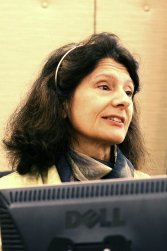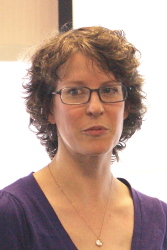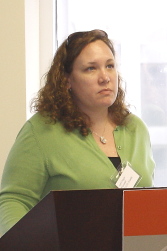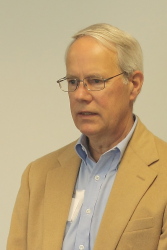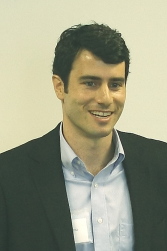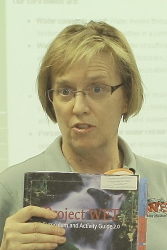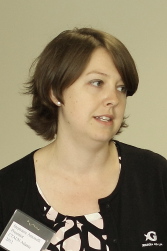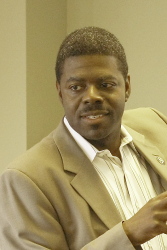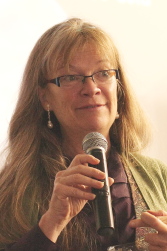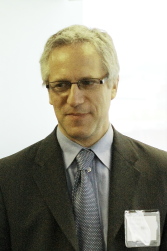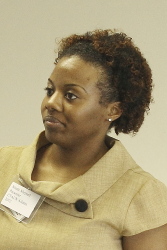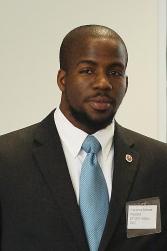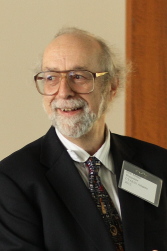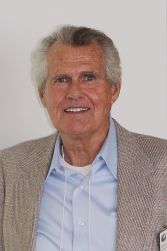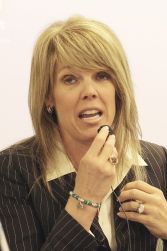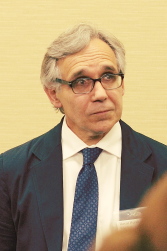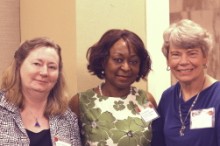2012 Atlanta
FIFTH ANNUAL CTAUN CONFERENCE IN ATLANTA
WATER: GLOBAL AND LOCAL CHALLENGES
Saturday, 17 March 2012 8:30 a.m. – 4:15 p.m.
College of Education, Georgia State University, Atlanta, GA
Conference Report
The College of Education at Georgia State University extended a warm welcome to all participants with remarks from Dr. Gwen Benson, Associate Dean and co-chair of the conference. She personally welcomed all and also shared remarks on behalf of Dean Randy Kamphaus.
Anne-Marie Carlson, Chair of CTAUN introduced the keynote speaker, Dr. Christina Moe from Emory University.
Dr. Moe’s address, titled “Evolution and Revolution in Water and Sanitation: From Atlanta to Accra” reflected her extensive experience in global health and water safety across the developing world. Some of the sobering facts presented include that only half of the children in the world have toilets at their schools and that 5,000 children die each day from lack of water or waterborne maladies. Dr. Moe brought attention to the Millennium Development Goals (MDGs) adopted by all United Nations members. The seventh goal includes the objective to reduce by half the population without sustainable access to safe drinking water and basic sanitation by 2015.
At present, the United States is the largest per capita consumer of water. The amount of water used by a society depends on what food is produced. For instance a hamburger requires 2,400 liters of water to produce. Dr. Moe brought to the attention of the audience that water is a unique, finite resource, and that water scarcity will have global repercussions related to food security, health, societal stability, development and peace.
After the keynote address, concurrent breakout sessions were offered. These sessions offered a wide range of topics to the participants.
Jannette Gayer and April Ingle represented Environment Georgia and the Georgia Water Coalition.
The report “Georgia’s Dirty Dozen” is available online at GA River Network. It lists the 12 “most endangered” rivers in GA. The Georgia Department of Environmental Protection had its budget cut by 44% and vacant positions go unfilled. These cuts have had detrimental effects on Georgia waterways. Environment Georgia is an advocacy group for legislation that affects our rivers. Both water quality and water quantity are terrifying problems that are complicated by many levels of government having a say: Local and county government, state agencies, EPD, state legislation, Federal agencies such as the EPA, and federal legislation. Four different bills dealing with water quality have been proposed this legislative session in Georgia that range from harvesting sunk logs to septic tank waste. All of the bills are in the interest of business and relax requirements. State rules for CAFO (Concentrated Animal Feeding Operations) are being rewritten and these are depleting the curbs that have been in place. Water quantity issues range from inter-basin transfer to in-stream flow policy, which needs updating and monitoring, and water rights issues.
The session closed on a positive note. Ms. Ingle suggested that we are finally accepting climate change and are beginning to limit the growth of greenhouse gases. Rising water levels and droughts will be worse until people use less water. The solution is to use less water; pollute less; and develop solar power. The speakers suggested getting involved with local and national organizations. Protect Georgia is a group made up of 12 or so organizations which sends out requests for action. The Sierra Club is a very active group of people. Another suggestion for action is to join a local river water group.
The organizations H2O for Life and World Water Relief were represented by Taylor Green and Clay Sparrow. H2O for Life was started by a few middle school teachers in Minnesota. The organization assists schools in the United States
to raise money to fund one half of the needed funds for a partner school to get equipment and training to filter water. The students are also provided with hygiene instruction and English lessons. The benefits of H2O for life are not only for the developing world partner schools. It also helps connect community groups in the United States for teaching and funding, helps them see themselves as agents for change, builds awareness of water use and sparks their creativity in how to raise the funds.
Georgia’s Project WET is a curriculum, as well as an instruction and delivery network, which is supplemented by national and international programs. It facilitates and promotes awareness, appreciation and stewardship of water resources and provides water education for K-12 teachers. Georgia coordinators
Monica Kilpatrick and Jo Adang represented the group and brought many examples of their teaching materials. The Project WET curriculum has been developed, field-tested, and correlated to the current Georgia Performance Standards. The program is sponsored by the Georgia Department of Natural Resources.
Stephanie Antonelli of the Georgia Aquarium explained how visiting the aquarium is an opportunity for students to discover the aquatic realm in an immersive learning environment. The aquarium’s education department strives to make the educational experience an extension of the classroom and offers two program options for school groups. Students can participate in an instructor-led program or a self-guided program. Camp H20 provides an opportunity for kids to grow their imagination in a day camp experience for children 5-11 years of age, offered during spring, summer and winter breaks.
Chesley McNeil, Meteorologist with WXIA/11 Alive, discussed weather and water in a room of educators and some students. He stated that water is the most important element in the atmosphere, but it is the least abundant. He discussed how global temperatures have increased over time and how climate change has an effect on the water cycle – increased moisture leads to an increase in clouds, which leads to more rainfall and flooding (http://www.kqed.org/education/educators/clue-into-climate/water-cycle.jsp). Meteorologists have identified that storms are occurring more frequently and with more intensity.
During the lunch break the participants had the pleasure of hearing Dr. Cherilynn Morrow, a Georgia State University professor of astronomy. She integrated the arts and science by providing a performance of jazz inspired by the water-blue Earth and its neighbors Mars and Venus. She sees water and life inextricably joined and gets her inspiration from the broader, scientific context of water and then joining it with her blues creation — LOOK UP.
After lunch Bill Yotive, manager of United Nations Global Teaching and Learning Project, Education
Outreach, Department of Public Information, discussed how he takes information and makes it useable for a younger audience, such as showing students a photograph and asking them to describe the picture. Mr. Yotive shared several photographs of children drinking water from a puddle on the ground and women carrying water back to their villages.
He said that water scarcity impacts gender, because the women in the community bear the responsibility of obtaining the water. The UN educators are trying to help students realize that rich and poor countries must come together to solve the world’s problems, most especially in the areas of water and gender. He also said we can raise awareness of our water needs through the food we eat (http://www.fao.org/nr/water/). Water is a basic human right.
Students from North Atlanta High School, which offers an IB (International Baccalaureate) curriculum, presented their work on two science studies involving water, The Impact of Soil pH and Phosphorus Levels on Plant Growth in the Chattahoochee River and The Impact of Oil Spills on Algal Growth. The students discussed their study design, the methods and materials they used, and the results of their study. They stated the results were not what they expected, and they offered ways in which they would change their study design. The NAHS students also participate in Model UN and Outward Bound. For their Water Project, they were able to raise money to build wells in Africa, by raising awareness of using only one gallon of water per day.
Georgia State University’s TEAM AmeriCorps speakers Nicole Shepard and Lawrence Johnson explained they were future teachers volunteering in public schools in order to enrich their own pre-classroom experience before completing the professional requirements for teaching. AmeriCorps, a national organization, helps people find volunteer opportunities through its network of partnerships with nonprofit groups. People of all ages and backgrounds are helping to meet local needs, strengthen communities, and increase civic engagement through national service.
In another concurrent session, Dr. Eric Mintz, a professor of organic chemistry from Clark Atlanta University,presented an overview of our national view of water sources, consumption and contamination. He suggested we need to be pricing water as a valuable commodity. Now it is essentially free. We also need to look at ways to purify water that use less energy. Dr. Mintz stated that we need to develop point of source treatment systems with local filtration.
Delon Barfuss, a Sierra Club volunteer, spoke for the Adopt-a-Stream Program. He explained its objectives which include increasing public awareness of point and non-point pollution; providing tools and training to evaluate waterways; encouraging partnerships between government and citizens; collecting quality baseline water data; and locating pollution sources. The frog and toad monitoring program follows these two indicator vertebrates who are often the first to be hurt by pollution. Data is collected on frog sounds and sightings. The Sierra Club monitors Rottenwood Creek in Cobb County. Biological, chemical and visual monitoring is oriented toward the quality of water.
In addition, Gasland – Can You Light Your Water On Fire? was shown during two other sessions. It was an Academy Award nominee (2010) for Best Documentary Feature on hydraulic fracturing (fracking) and its potential dangers.
Conference attendees welcomed water activist Laura Turner Seydel who is a national environmental advocate and chair of the Captain Planet Foundation, which promotes environmental education and gardens in schools. She gave a broad-ranging presentation to CTAUN attendees that addressed issues as global as the dangerous depletion of vast underground water reservoirs around the world, and as down home as the benefits of playing with kids in the dirt to teach them about the earth.
Laura serves on her family’s foundation boards, including The Turner Foundation, Jane Smith Turner Foundation, the Turner Endangered Species Fund, and Ted’s Montana Grill. She also serves on national boards including League of Conservation Voters, Defenders of Wildlife, Waterkeeper Alliance, and the Green Schools Alliance.
Laura’s passion for preservation and political activism on behalf of healthy kids’ initiatives and sustainable development was evident in her discussion with the attendees at the CTAUN conference in Atlanta, where Laura lives with her husband Rutherford and her three children in their home, EcoManor, the first LEED certified Gold residence in the Southeast. For more information about Laura Turner Seydel, visit www.lauraseydel.com.
The closing keynote speaker was Dr. David Hursh, a visiting research scholar at The Earth Institute of Columbia University.
He is creating pilot Millennium Village projects in Kenya and Uganda. Dr. Hursh argued for the need to teach children environmental health. He has developed a hygiene curriculum for schools as well as for parents. His goal is to encourage teachers to bring real issues into the classroom because these are the essential questions of our time. Hursh is interested in transforming school curricula; he argued for interdisciplinary topic-oriented activities showing an intersectional approach to development and education. Building a rainwater harvesting system created many teachable minutes for the community. Through the hands on projects, participants learn some mathematics, learn to think about systems and then can entertain the possibility of changing their worlds.
Closing remarks were offered by the co-chairs, Dr. Gwen Benson and Dr. Susan Ogletree, as well as by the CTAUN chair, Anne-Marie Carlson.
Our special thanks go to the following –
- Atlanta Chapter of the United Nations Association (UNA-USA) for providing the conference registrants with a lovely continental breakfast
- Delta Kappa Gamma, Georgia State for providing the perfect conference folders and labels plus photocopying and organizing all the contents
- Georgia State University’s College of Education for hosting our conference and opening its many facilities for our use
- The Atlanta steering committee for providing this conference report

